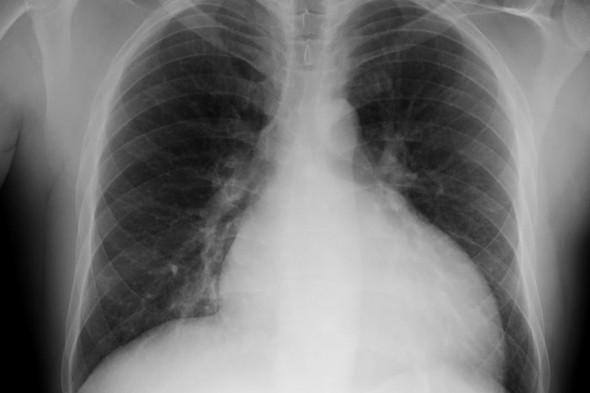Researchers find new targets for treating pulmonary hypertension
 Two new potential therapeutic targets for the treatment of pulmonary arterial hypertension, a deadly disease marked by high blood pressure in the lungs, have been identified by researchers at the University of Illinois at Chicago. Their findings are reported in the American Journal of Respiratory and Critical Care Medicine.
Two new potential therapeutic targets for the treatment of pulmonary arterial hypertension, a deadly disease marked by high blood pressure in the lungs, have been identified by researchers at the University of Illinois at Chicago. Their findings are reported in the American Journal of Respiratory and Critical Care Medicine.
Early symptoms of pulmonary arterial hypertension include shortness of breath and exercise intolerance. As the disease progresses, patients may require oxygen supplementation and lung transplantation. Heart failure can develop and is a major cause of death in the disease.
Most cases of pulmonary hypertension are of unknown cause, though the condition often occurs in association with other diseases, including scleroderma, congenital heart disease and liver disease. One of the underlying factors driving the increased blood pressure in the lungs is a narrowing of the pulmonary blood vessels. This narrowing can be due to an abnormal proliferation of cells within the walls of the blood vessels, particularly in the smooth muscle cells of the pulmonary artery.
Jiwang Chen, research assistant professor of critical care medicine, sleep and allergy in the UIC College of Medicine, and his colleagues investigated the molecular mechanisms behind the abnormal proliferation of smooth muscle cells in the pulmonary artery and discovered two ways that the proliferation could be suppressed.
They knew that an enzyme, sphingosine kinase 1, that produces a signaling molecule called sphingosine-1-phosphate (S1P), had been linked to the abnormal growth of cells in cancer, including lung cancer.
“The characteristic proliferation of cells that line the blood vessels in pulmonary hypertension is similar to the abnormal growth and reproduction of cells that form cancerous tumors,” says Chen. “We wanted to see if sphingosine kinase 1 and S1P were involved in the development of pulmonary arterial hypertension.”
Looking at samples of lung tissue from patients, Chen and colleagues found that patients with pulmonary arterial hypertension had significantly elevated levels of both the enzyme and the signaling molecule it produces. They found similarly elevated levels of both molecules in mouse and rat models of pulmonary hypertension.
Knockout mice lacking the gene for sphingosine kinase 1 were less likely than normal mice to develop pulmonary hypertension when exposed to the low-oxygen conditions used to induce the disease in the laboratory.
Drugs that either suppress production of sphingosine kinase 1 or block the signaling of S1P through its receptors on smooth muscle cells prevented mice from developing pulmonary hypertension in low-oxygen conditions.
The researchers also showed in mice that over-production of sphingosine kinase 1 and S1P promote the proliferation of pulmonary artery smooth muscle cells.
“Our results yield two new potential targets for the development of drugs to treat or prevent the progression of pulmonary arterial hypertension,” Chen said.
“By blocking the binding site for S1P or suppressing the production of S1P, like we did in our experimental rodent model, we can reduce the proliferation of pulmonary artery smooth muscle cells, which is a major contributor to pulmonary hypertension.”
Drs. Roberto Machado, associate professor of pulmonary, critical care, sleep and allergy in the UIC College of Medicine, and Viswanathan Natarajan, professor of pharmacology in the UIC College of Medicine, are senior authors on the paper. Other authors are Haiyang Tang, Justin Sysol, Liliana Moreno-Vinasco, Krystyna Shioura, Tianji Chen, Irina Gorshkova, Lichun Wang, Peter Usatyuk, Longshuang Huang, Saad Sammani, Guofei Zhou, Dr. Usha Raj, Dr. Joe G.N. Garcia, Evgeny Berdyshev and Dr. Jason X. J. Yuan. All authors are or were at UIC when the research was conducted.
This research was supported by grants R01HL111656, K23HL098454 and P01HL98050 from the National Heart, Lung and Blood Institute; a UIC Area of Excellence Award; and a Pulmonary Hypertension Association Proof-of-Concept Research Grant.
